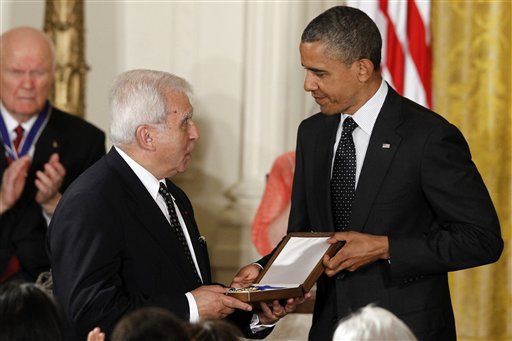
President Barack Obama’s “Polish death camps” gaffe, which has infuriated Poles and Polish-Americans alike, is not just the result of ignorance, or bad speechwriting (he apparently read the words from his teleprompter). Rather, it is the result of a foreign policy that has nothing to do with the interests and values of the United States as a whole, and everything to do with satisfying domestic political constituencies. Yesterday’s Presidential Medal of Freedom ceremony, where Obama’s gaffe took place, was only the latest and most laughable example.
Obama intended to honor Jan Karski, the late Polish resistance hero who famously tried to warn the world about the atrocities being committed by Nazis against Jews in the ghettos and death camps of Nazi-occupied Poland during the Second World War. In his remarks, he referred to the camps as “Polish death camps”–a reference that Poles have long regarded as highly prejudicial and inflammatory, implying Polish guilt in the Holocaust.
More precisely, Obama seemed to step into a historical argument that has simmered for decades between Jews and Poles–in the United States and worldwide–over the degree of Polish culpability in the wartime atrocities. (As a Jew with roots in Warsaw, and a former congressional candidate in one of the most heavily Jewish and Polish districts in the country, I can testify to the intensity of that debate, and the passion of the feelings it evokes on both sides.) The reason Obama erred is that he is actively trying to pander to both communities, with November in mind, and with votes more important than facts. Just as, earlier this month, the White House celebrated Nazi supporter Gertrude Stein in honoring Jewish Heritage Month, so it has now cast Poles in the role of Nazis.
A closer look at the roll of honor at yesterday’s ceremony emphasizes the point. Every minority group in the Obama campaign’s targeted election strategy is carefully represented. Even Israel’s president, Shimon Peres, was honored–no doubt to address election-year worries about Obama’s awful record on Israel. (Obama has had four years in which he could have honored Peres with the courtesy of a visit to Israel, which he has not done.)
To the extent that the media is covering Obama’s mistake, it is treating the “Polish death camps” gaffe as a foreign policy story. The White House is handling it that way, too, declaring: “The President has demonstrated in word and deed his rock-solid commitment to our close alliance with Poland.” That is a lie on par with the original gaffe; President Obama has demonstrated the opposite. He canceled a missile defense program with Poland in 2009–and informed the Polish prime minister on September 17, the 70th anniversary of the Soviet invasion of Poland. Obama ignored the impassioned pleas of former Polish leader Lech Walesa and Czech hero Vaclav Havel, who signed an open letter to him that July asking him not to leave Eastern Europe in the lurch.
Obama has long opposed missile defense–not only because of long-standing anti-military views that have only been slightly dulled by the experience of being commander-in-chief, not only because he wants to redistribute military funding to other government programs, but also because he shares the leftist impulse to humble the United States. And the reason the United States must be humbled, in the leftist view, is not to guarantee its enemies outright victory, but to convince Americans that their way of life is not superior, and that it must bow to socialist ideals that prevail elsewhere in the world–even in Europe, despite a raging socialist fiscal crisis.
But Obama is more than a leftist; he is also a Chicago politician. And big-city politicians of both parties discover that a cheap and easy way to rally voters from particular communities and interest groups–or at least to prevent a stronger vote for the opposite side–is to express public sympathy with whatever cause those constituencies hold dearest, even if those sympathies tend to contradict each other. Those politicians who care about being caught in the middle will be candid in expressing their own views, while remaining open to the views of others; those who believe they can get away with being all things to all people, or who see the whole exercise as just another way of feeding the voting machines, will fall into the trap that Obama has just sprung on himself.
For Obama, all foreign policy is domestic policy. That is true, to some extent, of all presidents, but especially of this one, whose fundamental ambition is the transformation of American society, and who is running a desperate divide-and-conquer strategy he hopes will enable him to carry that transformative agenda into a second term. As Charles Krauthammer has observed in the past, Obama does not particularly care about foreign policy at all, which is one reason he has no clear posture except compromise. The result is a world that is less secure for America, less safe for freedom, and more liable to be offended by the president’s errant teleprompter.

COMMENTS
Please let us know if you're having issues with commenting.